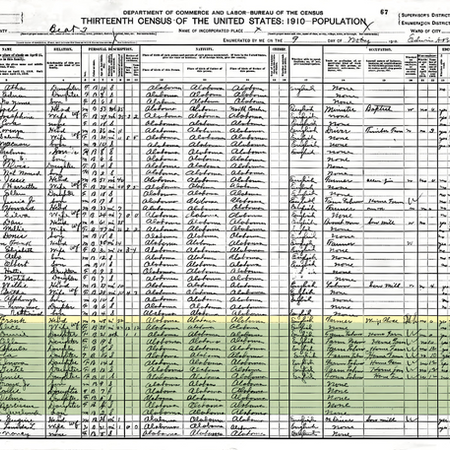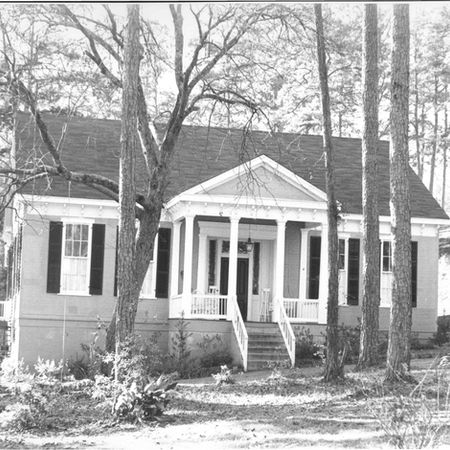
Frank M. Jones, Sr. (1862–1962)
A Century of Faith, Labor, and Legacy in Alabama
Born on January 25, 1862, in Mount Sterling, Alabama, Frank Jones, Sr. came into the world during America’s greatest moral reckoning—the Civil War. As the son of Benjamin and Venus Jones, Frank was born into slavery and orphaned by the age of six, after his father passed in 1868. Raised in Clarke County during the era of Reconstruction, Frank’s early years were defined by hardship, manual labor, and a determination to survive and build a life in the face of systemic oppression.
By 1870, just eight years old, Frank was already recorded as a farm laborer in Jackson, Alabama—working the land at an age when most children today are just learning to read. Though he could not yet read or write, he was helping to hold his family together, laying the foundation for a legacy of resilience.
In 1888, at age 26, Frank married Alice Nobles, a devoted wife with whom he would raise one of the largest known African American families in Clarke County during that time. Between 1889 and 1914, Frank and Alice welcomed over a dozen children into their home: daughters Annie, Alla Dean, Beula, Allar, Elnora, Gertrude, Amy, Velma, Narcissus (Norsie), Collie, and Alice; and sons Frank Jr., Emanuel Cleveland, Emerson (grandson raised as a son), and Freeman. By the time of the 1910 Census, Frank Jones Sr. was 48 years old and leading a bustling household of 14 family members on a rented farm along Jackson and Rockville Road in Clarke County, Alabama. The Jones home was not only intergenerational and full of life, but also firmly rooted in faith, education, and hard work. Most members of the household could read and write—an extraordinary accomplishment for an African American family in the early 20th-century rural Jim Crow South.
Frank was more than just a farm laborer; he worked directly for Mr. A.M. Wing, one of Clarke County’s most prominent landowners and civic leaders. Wing, a Confederate veteran, merchant, and major landholder, had amassed wealth through multiple plantations and businesses, including a mill, a cotton gin, and the Wing & DuBose Mercantile Company. He was widely known in Jackson for his charitable giving, his role in founding the local Presbyterian Church, and his influence over regional agriculture and finance. The Wing Plantation, where Frank labored, was one of the most substantial operations in the area—requiring reliable men like Frank to sustain its productivity.
Frank’s employment with Wing offered not only stability but also an indirect connection to the evolving economic infrastructure of Clarke County. As Wing expanded his holdings and supplied the region through banking, education, and milling, African American laborers like Frank carried the weight of that progress on their shoulders. Frank’s role as a dependable worker for one of the county’s wealthiest men speaks to his own reputation for diligence and integrity during a time of racial segregation and economic limitation.
Meanwhile, at home, Frank and his wife Alice had been married for 22 years and were raising a large family—ranging from young Cleveland at age 2 to their eldest, Annie, age 21. Despite the rural isolation and systemic injustice of early 20th-century Alabama, the Jones family remained united, resilient, and anchored by the values of literacy, labor, and loyalty. Their farmstead, though modest, was a stronghold of progress in a region still marked by the legacies of slavery and inequality.
Tragedy struck in 1922 when Frank lost his beloved wife, Alice, after 34 years of marriage. Yet Frank continued on—raising children, supporting his family, and relocating to Mobile County in the years that followed. By 1935, records place him in Whistler, Alabama, a growing African American community just outside Mobile. There, he owned a modest home valued at $300—hard-won property acquired through decades of labor. The 1940 census finds him at 72 years old, living in that same home with his daughter Gertrude. Though retired and without reported income for the year, Frank’s stability in old age was a testament to a life of unrelenting work and wise stewardship.
Frank Jones, Sr. lived through nearly every major shift in African American life—from enslavement to emancipation, from Reconstruction to segregation, from tenant farming to property ownership. His journey was marked not by fanfare, but by faith, sacrifice, and an unshakable commitment to family. He gave each of his children and grandchildren the chance to dream bigger than he could, and in doing so, became the spiritual and generational bedrock of the Jones-Carter family.
Before his death, Frank ensured his legacy would continue to provide for his descendants. In his last will and testament, he left one acre of land in Clarke County, Alabama, to each of his children—a symbolic and material gesture affirming the value of land, legacy, and labor. He also bequeathed his home in Prichard, Alabama, to his son E. Cleveland Jones and daughter Gertrude Jones, recognizing their loyalty and care in his later years.
Frank passed away on April 21, 1962, at the age of 100. He is buried in Mobile, Alabama, having lived long enough to witness the dawn of the Civil Rights Movement and the blooming fruit of the seeds he had planted generations earlier.
“Let us not become weary in doing good, for at the proper time we will reap a harvest if we do not give up.” — Galatians 6:9 (NIV)
Profile Gallery


